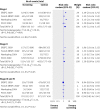Screening for prostate cancer: systematic review and meta-analysis of randomised controlled trials
- PMID: 20843937
- PMCID: PMC2939952
- DOI: 10.1136/bmj.c4543
Screening for prostate cancer: systematic review and meta-analysis of randomised controlled trials
Abstract
Objective: To examine the evidence on the benefits and harms of screening for prostate cancer.
Design: Systematic review and meta-analysis of randomised controlled trials.
Data sources: Electronic databases including Medline, Embase, CENTRAL, abstract proceedings, and reference lists up to July 2010. Review methods Included studies were randomised controlled trials comparing screening by prostate specific antigen with or without digital rectal examination versus no screening. Data abstraction and assessment of methodological quality with the GRADE approach was assessed by two independent reviewers and verified by the primary investigator. Mantel-Haenszel and inverse variance estimates were calculated and pooled under a random effects model expressing data as relative risks and 95% confidence intervals.
Results: Six randomised controlled trials with a total of 387 286 participants that met inclusion criteria were analysed. Screening was associated with an increased probability of receiving a diagnosis of prostate cancer (relative risk 1.46, 95% confidence interval 1.21 to 1.77; P<0.001) and stage I prostate cancer (1.95, 1.22 to 3.13; P=0.005). There was no significant effect of screening on death from prostate cancer (0.88, 0.71 to 1.09; P=0.25) or overall mortality (0.99, 0.97 to 1.01; P=0.44). All trials had one or more substantial methodological limitations. None provided data on the effects of screening on participants' quality of life. Little information was provided about potential harms associated with screening.
Conclusions: The existing evidence from randomised controlled trials does not support the routine use of screening for prostate cancer with prostate specific antigen with or without digital rectal examination.
Conflict of interest statement
Competing interests: All authors have completed the Unified Competing Interest form at
Figures
Comment in
-
Screening for prostate cancer.BMJ. 2010 Sep 14;341:c4538. doi: 10.1136/bmj.c4538. BMJ. 2010. PMID: 20843936 No abstract available.
-
Screening for prostate cancer. Consider the harms.BMJ. 2010 Oct 26;341:c5811. doi: 10.1136/bmj.c5811. BMJ. 2010. PMID: 20978045 No abstract available.
-
Meta-analysis finds screening for prostate cancer with PSA does not reduce prostate cancer-related or all-cause mortality but results likely due to heterogeneity - the two highest quality studies identified do find prostate cancer-related mortality reductions.Evid Based Med. 2011 Feb;16(1):20-1. doi: 10.1136/ebm1165. Epub 2011 Jan 12. Evid Based Med. 2011. PMID: 21228057 No abstract available.
-
ACP Journal Club. Review: Prostate cancer screening using PSA does not decrease mortality.Ann Intern Med. 2011 Jan 18;154(2):JC1-2. doi: 10.7326/0003-4819-154-2-201101180-02002. Ann Intern Med. 2011. PMID: 21242356 No abstract available.
References
-
- Parkin D, Bray F, Devesa S. Cancer burden in the year 2000. The global picture. Eur J Cancer 2001;37:S4-66. - PubMed
-
- Jemal A, Siegel R, Xu J, Ward E. Cancer statistics, 2010. CA Cancer J Clin 2010:10.3322/caac.20073. - DOI - PubMed
-
- Lin K, Lipsitz R, Miller T, Janakiraman S. Benefits and harms of prostate-specific antigen screening for prostate cancer: an evidence update for the U.S. Preventive Services Task Force. Ann Intern Med 2008;149:192-9. - PubMed
-
- Schroder FH, Hugosson J, Roobol MJ, Tammela TL, Ciatto S, Nelen V, et al. Screening and prostate-cancer mortality in a randomized European study. N Engl J Med 2009;360:1320-8. - PubMed
-
- Boyle P, Brawley OW. Prostate cancer: current evidence weighs against population screening. CA Cancer J Clin 2009;59:220-4. - PubMed
Publication types
MeSH terms
Grants and funding
LinkOut - more resources
Full Text Sources
Other Literature Sources
Medical
Miscellaneous




